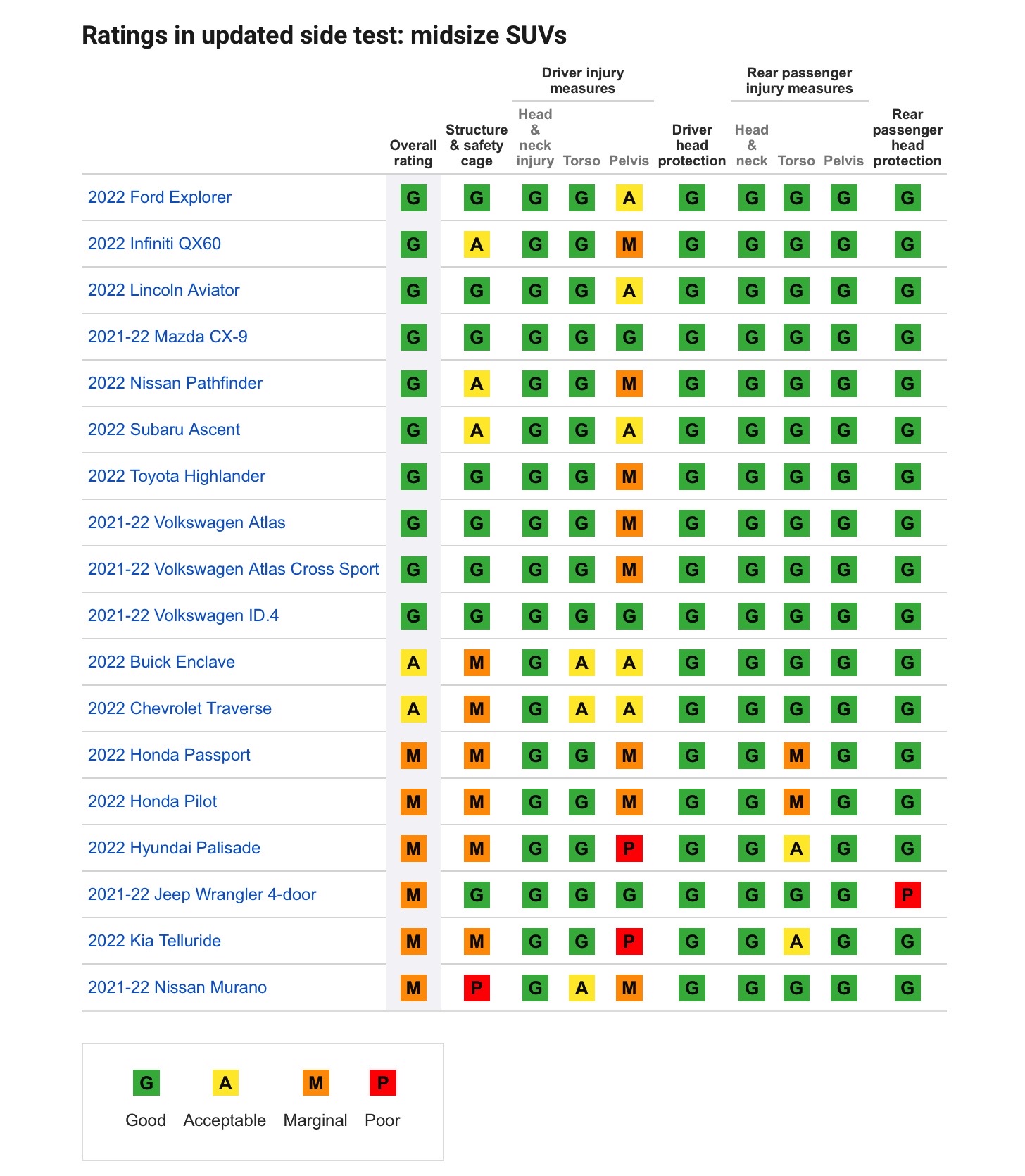More than half the midsize SUVs tested earn good ratings in the Insurance Institute for Highway Safety’s new side-impact evaluation.
Ten out of 18 midsize SUVs earn good ratings: the Ford Explorer, Infiniti QX60, Lincoln Aviator, Mazda CX-9, Nissan Pathfinder, Subaru Ascent, Toyota Highlander, Volkswagen Atlas, Volkswagen Atlas Cross Sport and Volkswagen ID.4, the only electric vehicle in the group.
Two more, the Buick Enclave and Chevrolet Traverse, earn acceptable ratings. Six others are rated marginal: the Honda Passport, Honda Pilot, Hyundai Palisade, Jeep Wrangler 4-door, Kia Telluride and Nissan Murano.
When IIHS announced the first ratings in the new test in October, only one out of 20 small SUVs managed a good rating, while half were rated marginal or poor.
“It’s encouraging to see so many midsize SUVs from different automakers earn good ratings in this more challenging evaluation,” says IIHS Senior Research Engineer Becky Mueller, whose research formed the foundation for the new test protocol. “These results will help confirm the adjustments they need to make to other vehicles going forward.”
IIHS introduced the new, tougher side test to address higher-speed crashes that continue to cause fatalities. Like the original side test, the new test represents the type of crash that occurs when two crossing vehicles collide in an intersection.
A 2011 study of 10 years’ worth of crash data found that a driver of a vehicle with a good rating in the original test is 70 percent less likely to die in a left-side crash than a driver of a vehicle with a poor rating. However, side impacts still accounted for 23 percent of passenger vehicle occupant deaths in 2020.
The updated evaluation uses a heavier barrier traveling at a higher speed to simulate the striking vehicle. Instead of the earlier 3,300 pounds, the new one weighs around 4,200 pounds, which approximates the weight of most modern midsize SUVs. Instead of striking the test vehicle at 31 mph, it hits it at 37 mph. Together, those changes mean the crash produces 82 percent more energy.
The honeycomb striking surface of the new barrier also has a different design that acts more like today’s SUVs or pickups when striking the side of another vehicle.
Like the original side test, the new test uses two SID-IIs dummies in the driver seat and in the rear seat behind the driver. The SID-IIs represents a small woman or 12-year-old child.
To earn a good rating in either the old or new side test, the vehicle’s occupant compartment must hold its shape well during the crash. Measures collected from the dummies must not indicate a high risk of severe injuries. In addition, the side airbags and seat belts should prevent the dummies’ heads from making hard contact with the interior of the vehicle.
Except for the Wrangler, all the midsize SUVs tested earn good scores for their driver and passenger airbags and head injury measures. The Wrangler, which does not have side airbags for the rear seating positions, earns a poor rating for passenger head protection. The absence of this crucial safety feature allowed the head of the rear passenger dummy to hit the vertical support of the vehicle’s removable roof and the window frame of the rear door. This fault was serious enough to bring the overall rating down to marginal, despite good ratings in all the other areas.
In contrast, only the CX-9, ID.4 and Wrangler earn good ratings for preventing injuries to the driver’s pelvis — the body region most frequently injured in real-world side crashes — although the Ascent, Aviator, Enclave, Explorer and Traverse earn acceptable scores.
Half the vehicles that earn good ratings overall — the Atlas, Atlas Cross Sport, Highlander, Pathfinder and QX60 — showed a moderate risk of severe injury to the driver’s pelvis. However, the driver’s vital body regions of head and torso (chest and abdomen) were well-protected in these models, as were the rear seat passenger’s head, torso and pelvis. Their good and acceptable structures also suggest that their occupant compartments are robust.
The small SUVs rated in October also struggled with driver pelvis injuries, but they performed markedly worse than their larger counterparts in preventing injuries to the chest or abdomen, perhaps due to their lower height relative to the striking barrier.
“A higher-riding vehicle may benefit from the barrier striking lower on its side,” says Raul Arbelaez, vice president of the Institute’s Vehicle Research Center.
The two acceptable-rated vehicles, the Enclave and the Traverse, fall short of good ratings due to marginal scores for occupant compartment structure.
Among the six vehicles that earn marginal ratings overall, the Murano earns a poor rating and the Pilot, Passport, Palisade and Telluride earn marginal ratings for structure. In the Passport and Pilot, the driver dummy also had high pelvis injury measures and the passenger dummy had high torso injury measures. Injury measures were also high for the driver pelvis in the Murano, Palisade and Telluride. The Wrangler earns a good rating in all those categories but earns a marginal rating overall because of its poor head protection for the rear passenger.
All 18 midsize SUVs and all 20 small SUVs evaluated in October earn good ratings in the original IIHS side test, which will remain the requirement for the TOP SAFETY PICK and TOP SAFETY PICK+ awards until the updated test replaces it in 2023.
